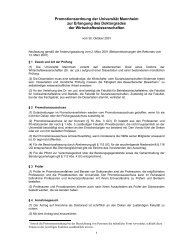The returns to cognitive and non-cognitive abilities in Germany
The returns to cognitive and non-cognitive abilities in Germany
The returns to cognitive and non-cognitive abilities in Germany
Create successful ePaper yourself
Turn your PDF publications into a flip-book with our unique Google optimized e-Paper software.
Turn<strong>in</strong>g <strong>to</strong> the estimates for <strong>cognitive</strong> <strong>abilities</strong>, we f<strong>in</strong>d further differences by gender:<br />
<strong>The</strong> coefficients for fluid <strong>in</strong>telligence are not statistically different from zero <strong>in</strong> the<br />
regressions for females. Yet, <strong>cognitive</strong> <strong>abilities</strong> are relevant for males’ wages. <strong>The</strong><br />
coefficients for the symbol correspondence test imply wage benefits of about 2% for a one<br />
st<strong>and</strong>ard deviation <strong>in</strong>crease <strong>in</strong> the test score (Table 1, columns 3 <strong>and</strong> 4).<br />
Panel results<br />
One might be tempted <strong>to</strong> ask why one should use panel methods at all, s<strong>in</strong>ce<br />
<strong>cognitive</strong> <strong>abilities</strong> or personality traits might serve as proxies for unobservable heterogeneity.<br />
However, this depends on the specific measures. Employ<strong>in</strong>g panel estima<strong>to</strong>rs might thus<br />
account for rema<strong>in</strong><strong>in</strong>g <strong>in</strong>dividual specific heterogeneity. Our results <strong>in</strong> fact show that the<br />
FFM <strong>in</strong>dica<strong>to</strong>rs <strong>and</strong> the ones on reciprocity are sensitive <strong>to</strong> account<strong>in</strong>g for further<br />
unobservable heterogeneity. In particular, with the exception of a wage penalty of about 3%<br />
for agreeableness for females, <strong>non</strong>e of the FFM covariates is statistically different from zero<br />
anymore <strong>in</strong> the HTIV regressions (Table 2, column 2). <strong>The</strong> results also change dramatically<br />
for males <strong>in</strong>asmuch as <strong>non</strong>e of the FFM covariates is statistically significant. Apart from<br />
that, there is no effect of negative reciprocity, but a wage benefit from positive reciprocity of<br />
about 2% for both males <strong>and</strong> females. Hence, the f<strong>in</strong>d<strong>in</strong>gs of Dohmen et al. (2009) for their<br />
cross-section of the SOEP can be confirmed us<strong>in</strong>g panel data techniques, even if additional<br />
personality <strong>in</strong>dica<strong>to</strong>rs <strong>and</strong> <strong>cognitive</strong> skills are <strong>in</strong>cluded.<br />
[Table 2 about here]<br />
<strong>The</strong> changes <strong>in</strong> the f<strong>in</strong>d<strong>in</strong>gs from OLS <strong>to</strong> panel estimates suggest that parts of<br />
<strong>in</strong>dividuals’ unobservable heterogeneity are captured by FFM traits <strong>and</strong> reciprocity<br />
<strong>in</strong>dica<strong>to</strong>rs. This however seems not <strong>to</strong> be the case for the rema<strong>in</strong><strong>in</strong>g personality trait, the<br />
external locus of control i.e. the attitude <strong>to</strong> believe that the experienced outcomes are<br />
22















